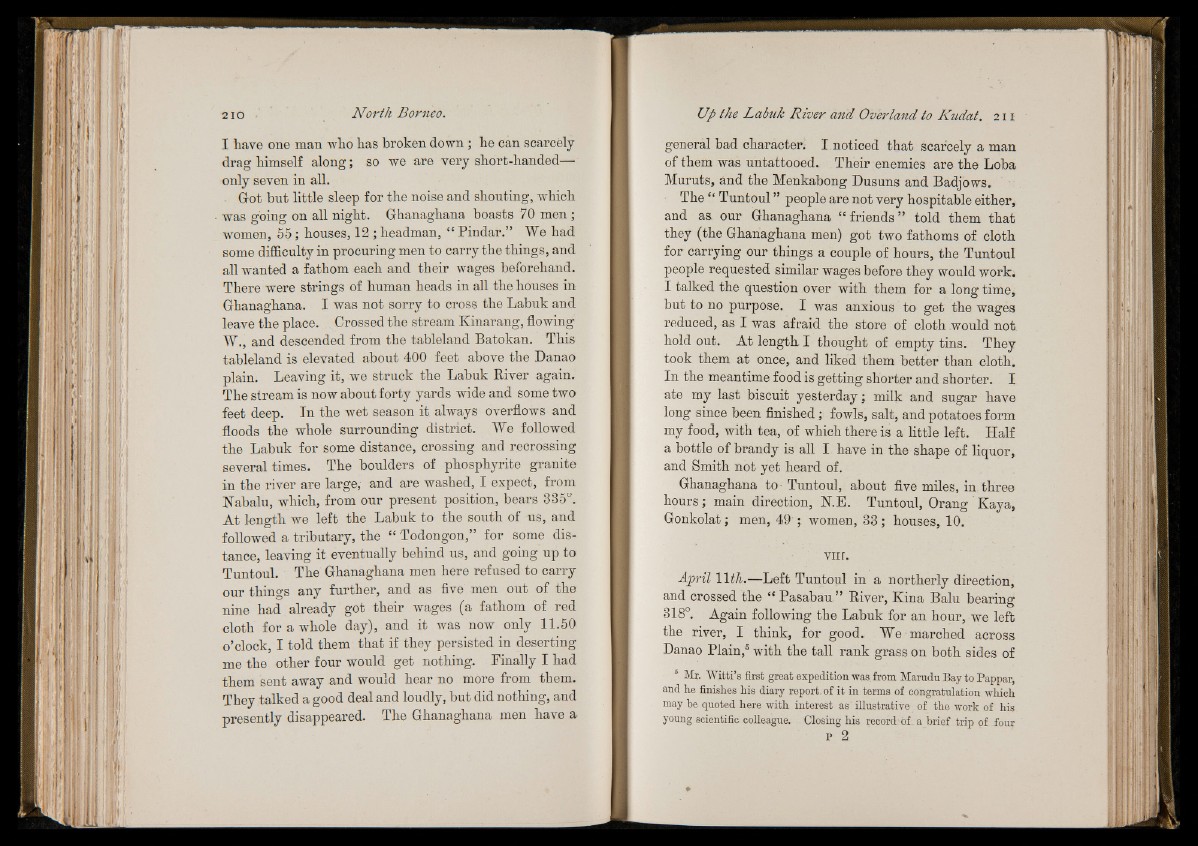
I have one man who has broken down ; he can scarcely
drag himself along; so we are very short-handed—
only seven in all.
Got but little sleep for the noise and shouting, which
was going on all night. Ghanaghana boasts 70 men ;
women, 55; houses, 12 ; headman, “ Pindar.” We had
some difficulty in procuring men to carry the things, and
all wanted a fathom each and their wages beforehand.
There were strings of human heads in all the houses in
Ghanaghana. I was not sorry to cross the Labuk and
leave the place. Crossed the stream Kinarang, flowing
W., and descended from the tableland Batokan. This
tableland is elevated about 400 feet above the Danao
plain. Leaving it, we struck the Labuk River again.
The stream is now about forty yards wide and some two
feet deep. In the wet season it always overflows and
floods the whole surrounding district. We followed
the Labuk for some distance, crossing and recrossing
several times. The boulders of phosphyrite granite
in the river are large, and are washed, I expect, from
Nabalu, which, from our present position, bears 335°.
At length we left the Labuk to the south of us, and
followed a tributary, the “ Todongon,” for some distance,
leaving it eventually behind us, and going up to
Tuntoul. The Ghanaghana men here refused to carry
our things any further, and as five men out of the
nine had already got their wages (a fathom of red
cloth for a whole day), and it was now only 11.50
o’clock, I told them that if they persisted in deserting
me the other four would get nothing. Finally I had
them sent away and would hear no more from them.
They talked a good deal and loudly, but did nothing, and
presently disappeared. The Ghanaghana men have a
general bad character. I noticed that scarcely a man
of them was untattooed. Their enemies are the Loba
Muruts, and the Menkabong Dusuns and Badjows.
The “ Tuntoul ” people are not very hospitable either,
and as our Ghanaghana “ friends” told them that
they (the Ghanaghana men) got two fathoms of cloth
for carrying our things a couple of hours, the Tuntoul
people requested similar wages before they would work.
I talked the question over with them for a long time,
but to no purpose. I was anxious to get the wages
reduced, as I was afraid the store of cloth would not
hold out. At length I thought of empty tins. They
took them at once, and liked them better than cloth.
In the meantime food is getting shorter and shorter. I
ate my last biscuit yesterday; milk and sugar have
long since been finished; fowls, salt, and potatoes form
my food, with tea, of which there is a little left. Half
a bottle of brandy is all I have in the shape of liquor,
and Smith not yet heard of.
Ghanaghana to- Tuntoul, about five miles, in three
hours; main direction, N.E. Tuntoul, Orang’Kaya,
Gonkolat; men, 49'; women, 33; houses, 10.
vii r.
April 11th.—Left Tuntoul in a northerly direction,
and crossed the “ Pasabau ” River, Kina Balu bearing
318°. Again following the Labuk for an hour, we left
the river, I think, for good. We marched across
Danao Plain,6 with the tall rank grass on both sides of
6 Mr. Witti’s first great expedition was. from Marudu Bay to Pappar,
and he finishes his diary report, of it in terms of congratulation which
may he quoted here with interest as illustrative of the work of his
young scientific colleague. Closing his record of a brief trip of four
r 2